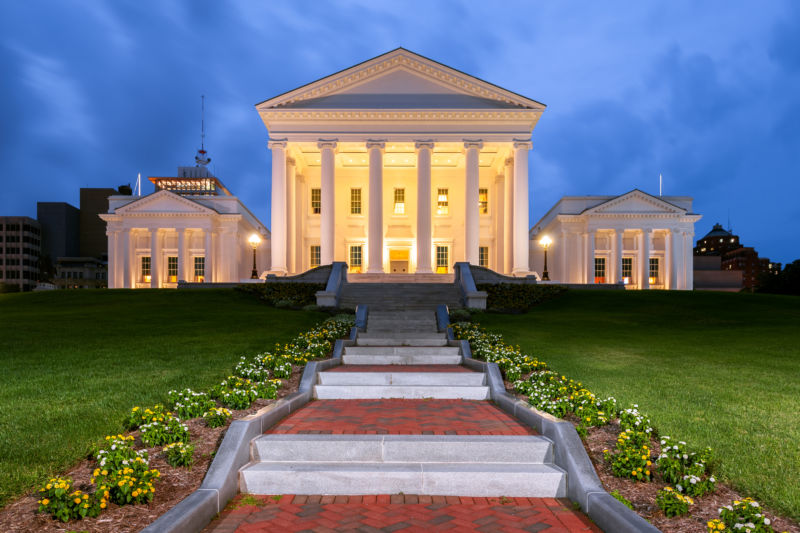
Virginia lawmakers are considering a bill called the "Virginia Broadband Deployment Act," but instead of resulting in more broadband deployment, the legislation would make it more difficult for municipalities to offer Internet service.
The Virginia House of Delegates legislation proposed this week by Republican lawmaker Kathy Byron (full text) would prohibit municipal broadband deployments except in very limited circumstances. Among other things, a locality wouldn't be allowed to offer Internet service if an existing network already provides 10Mbps download and 1Mbps upload speeds to 90 percent of potential customers. That speed threshold is low enough that it can be met by old DSL lines in areas that haven't received more modern cable and fiber networks.
Even if that condition is met, a city or town would have to jump through a few hoops before offering service. The municipality would have to pay for a "comprehensive broadband assessment," and then issue a request for proposals giving for-profit ISPs six months to submit a plan for broadband deployment. After receiving proposals from private ISPs, the local government would have to determine whether providing grants or subsidies to a private ISP would be more cost-effective than building a municipal broadband network.
The bill, which is being pushed by the Virginia Cable Telecommunications Association lobby group, would also make it hard for localities to offer lower rates than private ISPs. A locality would not be allowed to price its services at a sum less than the "actual direct costs" and "actual indirect costs" of providing the service, and it would have to boost the prices it charges customers by "includ[ing] within its rates an amount equal to all taxes, fees, and other assessments that would be applicable to a similarly situated private provider of the same communications services, including federal, state, and local taxes; franchise fees; permit fees; pole attachment fees; and any similar fees."
Moreover, the legislation would give private ISPs grounds to challenge municipal broadband projects in court. Local governments seeking to offer broadband would have to file various documents with the state Broadband Advisory Council at least 120 days before construction and "an annual certification by July 1 of each year that any expansion to or changes in its projects or system since the preceding July 1 still qualify as broadband expansion services."
"Any person who believes that any part of such filings is incomplete, incorrect, or false and who is in the business of providing Internet services within the locality shall have standing to bring an action in the circuit court for the locality to seek to require the locality to either comply with the substantive and procedural content of the filings required by this section, or cease to provide services, and no bond shall be required for injunctive relief against the locality," the legislation says.
Existing projects would be grandfathered, but only within the geographic area where they already provide service. That would prevent future expansions.
Local official worries about fate of new network
Virginia already has one law limiting the ability to create municipal broadband projects, but the Byron proposal would make things more difficult for projects allowed under the previous law. One entity that could be affected is the Roanoke Valley Broadband Authority, which "in April 2016 announced the lighting of a 47-mile broadband network running through Roanoke, Salem and parts of Botetourt and Roanoke counties," The Roanoke Times noted in an article yesterday. Roanoke County supervisors have set aside $9.6 million for construction and the first six years of operating costs, but with the way the new legislation is written, Roanoke City Manager Chris Morrill told the paper he "can't imagine how" the project would survive. "And we would have lost this important investment that we’ve made.” About 98 percent of households within Roanoke already have access to 10Mbps download speeds.
Morrill said the legislation would help incumbent ISPs by reducing competition, "but it does not serve citizens, it does not create jobs."
The Roanoke Times wrote that Byron has received $36,100 in campaign donations from Verizon since 1998. "Other donation totals include $15,000 from the Virginia Cable Telecommunications Association, $9,250 from AT&T, $3,500 from CenturyLink and $3,000 from Comcast," the newspaper said. Those numbers come from the Virginia Public Access Project.
Byron told the newspaper that she is "tweaking" the bill but does not expect major changes. Republicans have the majority in both chambers of the Virginia legislature.
“I just think government needs to be very cautious about investing taxpayer dollars in these networks that they not only have to be able to manage, but they also have to maintain them,” Byron told The Roanoke Times. "Maintaining this type of stuff is much better done by private business.”
The Federal Communications Commission in 2015 voted to preempt similar laws in North Carolina and Tennessee that restricted growth of municipal broadband. But the states sued and a federal appeals court overturned the FCC decision, letting states continue to impose restrictions on municipal Internet projects.
reader comments
177